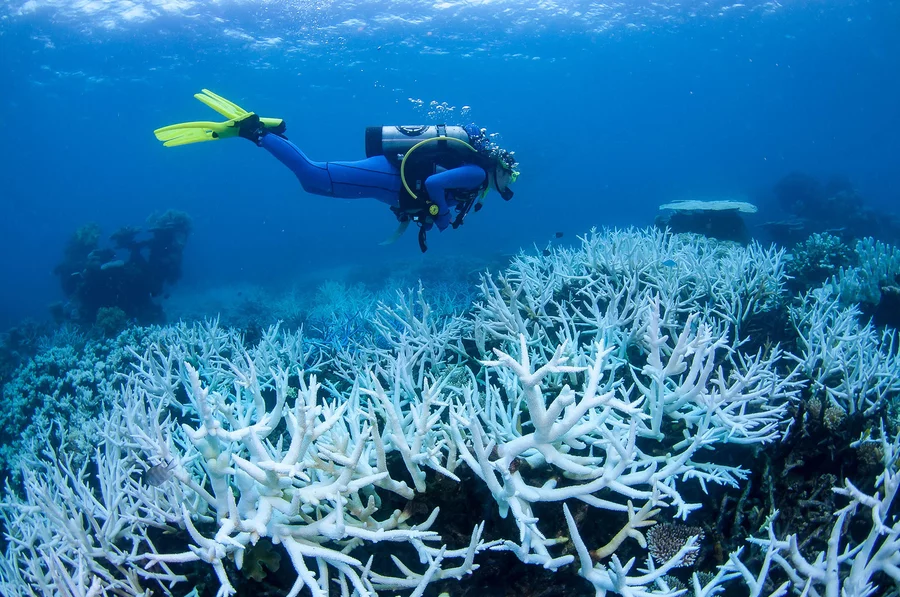
In the AIMS long-term survey covering August 2024 – May 2025, the Great Barrier Reef recorded its largest annual drop in live coral cover since monitoring began 39 years ago. There was roughly ~33% loss in the south, ~25% in the north, and ~14% in the central region. These losses were driven primarily by heat-driven mass bleaching in 2024, with cyclones and crown-of-thorns starfish compounding the damage.
This collapse sits inside a global context: NOAA confirms the world is in the 4th global coral bleaching event (started 2023), with bleaching-level heat stress impacting nearly 84% of the world’s reef area from Jan 2023–May 2025. That’s planetary scale.
We did this, how humans are responsible….
This isn’t “nature being dramatic.” This is predictable physics, policy failure and industrial convenience:
• Global heating – Burning fossil fuels raises ocean temperatures; corals bleach when heat crosses physiological thresholds for weeks. The 2024 mass bleaching was a product of record global heat and is the primary cause of the recent coral deaths.
• Ocean chemistry change – CO₂ doesn’t just warm oceans; it acidifies them, undermining corals’ ability to build skeletons over years. IPCC science shows reefs are uniquely vulnerable as we approach ~1.2 -1.5°C of warming.
• Local pressures – dredging, coastal development, agricultural runoff and destructive fishing raise sediments and nutrients, smothering corals and increasing disease risk. These amplify the harm from heat.
• Policy & politics – Delayed targets, greenwashing, and lobbying slow emissions cuts. The result? More frequent mass bleaching events and less time for reefs to recover. (See AIMS commentary on increased volatility over the last 15 years.)
Put bluntly: our choices made this likely. Our inaction made it inevitable.
How we’ll pay the price…..
This is where facts get personal. The cost is economic, cultural, and existential:
1) Money & jobs: The Reef isn’t just pretty – it’s an economic engine. Research shows the Great Barrier Reef generated about A$6.4 billion in value and supported ~64,000 jobs (tourism, fisheries, services) in 2015–16. That money is at risk if tourism and fisheries decline. .
2) Food & livelihoods: Hundreds of millions rely on reef fisheries globally for protein and income. Reef collapse shrinks catches, raises food insecurity, and pressures economies – particularly in coastal and island nations.
3) Coastal protection & real estate risk: Healthy reefs dampen wave energy. Losing them increases coastal erosion and flood risk, pushing up insurance and repair costs for communities and developers. US and Australian studies link reef loss to higher flood damages.
4) Culture & identity: For First Nations Australians and coastal communities, reefs hold stories, livelihoods and spiritual ties. That cultural capital is irreplaceable, and its loss can fuel social breakdown, displacement, and grief.
5) Ecological cascade: Reefs host ~25% of marine biodiversity. Their decline triggers knock-on extinctions and fisheries collapse that ripple through oceans and human communities.
Translation: if the reef dies, we pay with jobs, food, money, safety, and culture. It’s not distant – it’s already starting.
Where we can push – short, practical actions that actually move the needle
Don’t just feel bad. Do something effective.
- Demand stronger emissions targets – Pressure MPs and governments to adopt rapid 2030–2035 decarbonisation pathways (science says fast cuts save reefs).
- Back Indigenous-led reef management – Fund First Nations stewardship and local restoration programs; they hold place-based knowledge crucial for resilience.
- Stop local damage – Oppose destructive coastal development, support runoff controls, and hold polluters accountable.
- Support credible reef work – Donate to vetted restoration and monitoring groups (AIMS partners, Reef Trust, Indigenous rangers).
- Shift personal & community emissions – Fly less, push workplaces to net-zero, support low-carbon tech. Small reductions scale; policy unlocks big ones.
- Amplify evidence, not panic – Share AIMS and NOAA material, high-quality images, and human stories to push public pressure.
“We didn’t inherit the reef we borrowed it from future generations.
Today we’re calling that loan overdue.”

No responses yet